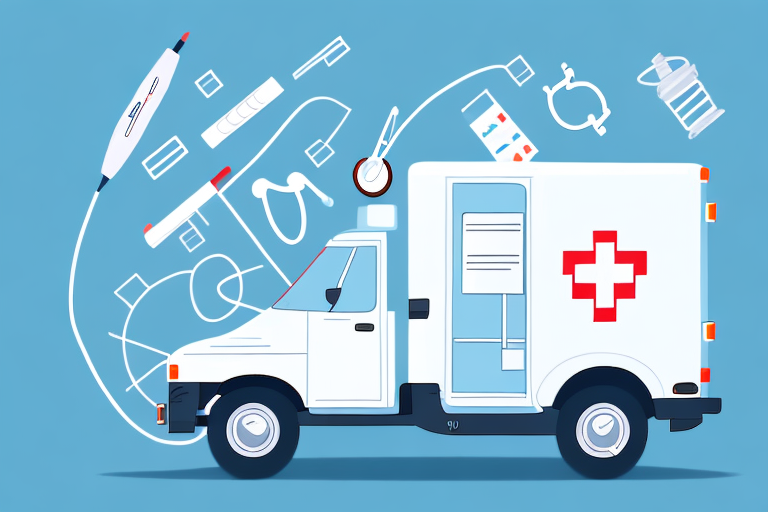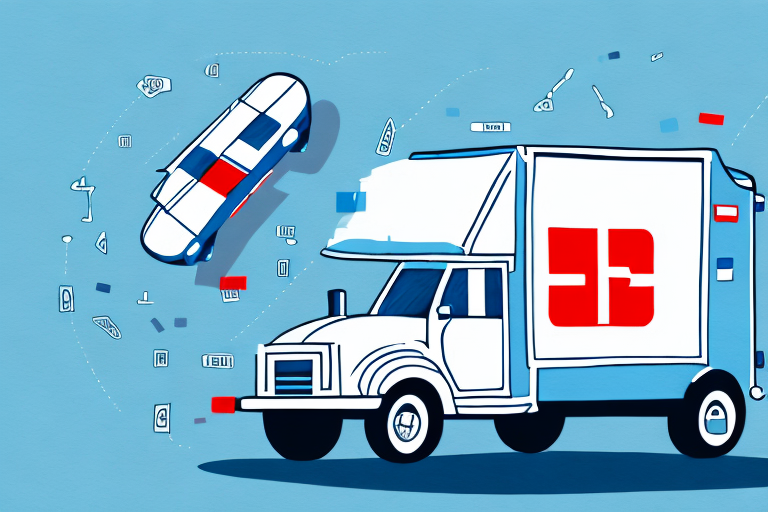How to Start a Medical Courier Business: A Step-by-Step Guide
Starting a medical courier business can be a rewarding and profitable venture. As the healthcare industry continues to grow, so does the need for efficient and reliable transportation of medical supplies, equipment, and samples. In this step-by-step guide, we will cover everything you need to know to start your own medical courier business, from identifying your target market and understanding legal requirements to developing an effective marketing strategy and managing financials. Let's dive in.
Why Start a Medical Courier Business?
The healthcare industry is one of the fastest-growing sectors globally. According to a report by Grand View Research, the medical supply distribution market is projected to reach significant heights by 2025, driven by increasing demand for healthcare services and advancements in medical technology. This growth creates a robust demand for medical courier services, which are essential for the secure and timely delivery of medical supplies, specimens, and equipment.
Moreover, the demand for medical courier services extends beyond urban areas. Rural healthcare facilities often lack the necessary infrastructure to transport medical supplies efficiently, presenting opportunities for courier businesses to serve a wide range of clients, from small clinics in remote locations to large metropolitan hospitals.
Additionally, starting a medical courier business typically requires a lower initial investment compared to other healthcare-related businesses, making it an attractive option for entrepreneurs with limited capital.
The Benefits of Starting a Medical Courier Business
There are numerous advantages to launching a medical courier business:
- Low Start-Up Costs: Starting a medical courier business generally requires less capital compared to other healthcare ventures such as hospitals or clinics.
- Steady Demand: Healthcare facilities require courier services daily, ensuring a consistent flow of business.
- Flexible Schedule: Business owners have the autonomy to set their own schedules and manage their operations effectively.
- Potential for Growth: With the continuous expansion of the healthcare industry, there are ample opportunities for scaling and increasing revenue.
Beyond financial benefits, running a medical courier business provides a sense of fulfillment by contributing to the healthcare system and ensuring that critical medical supplies reach their destinations promptly, thereby supporting patient care and safety.
Identifying Your Target Market for a Medical Courier Business
Defining your target market is crucial for the success of your medical courier business. Potential clients include:
- Hospitals and clinics
- Laboratories and diagnostic centers
- Pharmacies
- Medical equipment suppliers and distributors
- Home healthcare providers
- Individual patients requiring home delivery of medical supplies
Targeting a diverse range of clients, including those in rural areas, can help expand your customer base and increase business stability. For instance, elderly or disabled individuals often require reliable delivery services for medical equipment and prescriptions, offering another avenue for service provision.
Understanding the Legal Requirements for a Medical Courier Business
Compliance with legal and regulatory standards is essential when starting a medical courier business. Key considerations include:
- Obtaining necessary licenses and permits
- Securing appropriate insurance coverage
- Adhering to HIPAA regulations for handling sensitive medical information
Consulting with legal professionals can help ensure that you meet all regulatory requirements and avoid potential legal issues.
Additionally, ensuring the safety and security of transported medical items is paramount. Implement proper handling and storage procedures, conduct background checks on employees, and provide comprehensive training to maintain professionalism and confidentiality.
Licensing and Permits Required for a Medical Courier Business
Licensing and permit requirements for a medical courier business can vary based on local and state regulations. Common requirements include:
- A commercial driver’s license (CDL)
- Business licenses
- Permits for transporting hazardous materials
- Medical waste transportation permits
Federal regulations may also apply. For example, the Department of Transportation (DOT) mandates specific training and certification for drivers handling hazardous materials. It's essential to research and comply with all applicable regulations to avoid penalties.
Insurance is another critical component. Liability insurance protects your business against potential accidents or damages during transport. Additionally, some clients may require proof of insurance before engaging your services.
Setting Up Your Medical Courier Business: Office Space and Staffing Needs
Establishing an efficient workspace is vital for managing your medical courier business. Consider the following:
- Office Space: Options include working from home or renting a small office. Ensure that the space is equipped with necessary technology such as computers, printers, scanners, and reliable communication devices.
- Staffing: Hire dependable drivers and administrative staff to handle deliveries, billing, and customer service. Implement a thorough vetting process to ensure that drivers have clean driving records and understand safety protocols.
Investing in specialized equipment, such as refrigerated containers for temperature-sensitive medical items, can enhance your service offerings and meet specific client needs.
Developing an Effective Marketing Strategy for Your Medical Courier Business
A robust marketing strategy is essential to attract and retain clients. Key strategies include:
- Advertising: Promote your services in medical publications and attend healthcare industry events to increase visibility.
- Partnerships: Collaborate with healthcare facilities and providers to establish long-term relationships.
- Online Presence: Create a professional website that underscores your services and expertise. Utilize social media platforms to engage with potential clients and showcase your company culture.
- Referral Programs: Offer incentives to current clients for referring new customers, thereby leveraging word-of-mouth marketing.
Implementing search engine optimization (SEO) techniques can also enhance your online visibility, driving more traffic to your website.
Establishing Partnerships with Healthcare Facilities and Providers
Building strong partnerships with healthcare facilities and providers is crucial for a steady flow of business. Strategies include:
- Specialized Services: Offer services tailored to the specific needs of healthcare providers, such as temperature-controlled transportation for sensitive equipment or same-day delivery for urgent supplies.
- Responsive Communication: Maintain open lines of communication with partners by providing regular updates on delivery statuses and promptly addressing any concerns or issues.
- Reliability: Consistently delivering services on time and maintaining high-quality standards can enhance your reputation and foster long-term partnerships.
These partnerships not only ensure a steady stream of business but also enhance your credibility within the industry.
Finding Reliable Drivers for Your Medical Courier Business
Drivers are the backbone of your medical courier business. To recruit and retain reliable drivers, consider the following:
- Competitive Compensation: Offer attractive salaries and benefits to attract quality drivers.
- Comprehensive Training: Provide ongoing training on safety procedures, handling of medical items, and customer service to ensure high standards.
- Thorough Vetting: Implement a careful vetting process to ensure drivers have clean driving records and a strong understanding of safety protocols.
- Clear Communication Channels: Equip drivers with reliable communication tools, such as mobile phones or two-way radios, to facilitate timely and effective communication with dispatchers and clients.
- Driver Recognition Programs: Introduce incentive programs to reward top-performing drivers, fostering a culture of excellence and motivating all drivers to perform at their best.
Choosing the Right Vehicles for Your Medical Courier Business
The selection of vehicles plays a critical role in the efficiency and safety of your medical courier operations. Consider the following when choosing vehicles:
- Type of Vehicles: Depending on the size and nature of medical items, options may include cars for smaller deliveries, vans for medium-sized loads, or trucks for larger equipment.
- Maintenance: Regular maintenance and servicing of vehicles are essential to prevent breakdowns and ensure timely deliveries.
- Specialized Equipment: For transporting temperature-sensitive items, invest in vehicles equipped with refrigerated compartments to maintain the required temperature levels.
Implementing Secure and Efficient Delivery Procedures
Security and efficiency are paramount in delivering medical supplies and equipment. To ensure both, implement the following procedures:
- Handling Protocols: Develop strict protocols for handling and transporting sensitive medical materials to prevent contamination or damage.
- Tracking Deliveries: Utilize tracking systems to monitor deliveries in real-time, ensuring transparency and timely updates for clients.
- Customer Satisfaction: Implement feedback mechanisms to gauge customer satisfaction and address any issues promptly, thereby maintaining high service standards.
Managing Financials: Budgeting, Invoicing, and Billing for a Medical Courier Business
Effective financial management is crucial for the sustainability of your medical courier business. Key aspects include:
- Budgeting: Develop a comprehensive budget that accounts for all expenses, including vehicle maintenance, salaries, insurance, and marketing costs.
- Cash Flow Planning: Create a cash flow plan to manage incoming and outgoing funds, ensuring that your business remains financially healthy.
- Invoicing and Billing: Use specialized accounting software to streamline invoicing and billing processes, ensuring accurate financial records and timely payments from clients.
Maintaining precise financial records not only helps in tracking business performance but also aids in making informed financial decisions.
Maintaining Quality Control in Your Medical Courier Business
Quality control is essential for maintaining the reputation and reliability of your medical courier business. Implement the following measures:
- Regular Vehicle Maintenance: Schedule routine maintenance checks to ensure that all vehicles are in optimal working condition.
- Driver Training: Conduct frequent training sessions for drivers on safety protocols, handling of medical items, and customer service best practices.
- Regulatory Compliance: Continuously monitor and adhere to all relevant regulatory requirements to maintain operational standards.
- Customer Feedback: Utilize customer satisfaction surveys to gather feedback and identify areas for improvement.
Scaling Your Medical Courier Business: Expansion Strategies and Tactics
As your medical courier business grows, implementing effective expansion strategies is key to increasing profitability. Consider the following tactics:
- Geographic Expansion: Extend your services to new regions or states to tap into larger markets.
- Diversifying Services: Introduce additional services such as specialized transportation for specific medical equipment or offering 24/7 delivery options.
- Technology Integration: Invest in advanced logistics and tracking technologies to enhance efficiency and provide better service to clients.
- Strategic Partnerships: Form alliances with other businesses in the healthcare sector to broaden your service offerings and client base.
Common Challenges Faced by Medical Courier Businesses and How to Overcome Them
Running a medical courier business comes with its set of challenges. Here are some common issues and strategies to address them:
- Regulatory Compliance: Keeping up with changing regulations can be daunting. Stay informed by regularly consulting official resources and consider hiring compliance experts.
- Driver Shortages: Attract and retain qualified drivers by offering competitive salaries, benefits, and a positive work environment.
- Unexpected Expenses: Maintain a financial buffer to manage unforeseen costs such as vehicle repairs or emergency staffing needs.
- Maintaining Quality Service: Consistently monitor service quality through customer feedback and implement improvements as needed.
By proactively addressing these challenges, you can ensure the resilience and longevity of your medical courier business.
Future of the Medical Courier Industry: Trends and Opportunities
The medical courier industry is poised for continued growth, influenced by several emerging trends and opportunities:
- Technology Advancements: The integration of GPS tracking, temperature-monitoring sensors, and automated dispatch systems enhances delivery efficiency and security.
- Telemedicine Growth: The rise of telemedicine increases the demand for specialized delivery services for medical equipment and supplies required for remote consultations.
- Sustainability: There is a growing emphasis on eco-friendly practices, leading to opportunities for businesses that implement green logistics solutions.
- Customized Services: Offering tailored services to meet the specific needs of different healthcare providers can differentiate your business in a competitive market.
Staying abreast of these trends and adapting your business model accordingly will help you capitalize on new opportunities and maintain a competitive edge in the medical courier industry.
Starting a medical courier business requires careful planning and attention to detail, but it can be a rewarding and lucrative venture. By following these steps and maintaining a commitment to quality and customer satisfaction, you can build a successful business in this growing industry.








